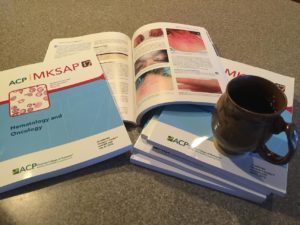August 29th, 2016
Multiple Choice Medicine
Amanda Breviu, MD
You are currently on inpatient wards and notice your chief medical resident has been demonstrating erratic behavior, frequently muttering about MEN syndromes and antibodies associated with rheumatologic diseases and has been reciting gene translocations. What is the most likely cause of her symptoms?
A. Hospital-associated delirium
B. Conversion disorder.
C. Symptoms related to completing an excess number of multiple choice questions in preparation for taking Internal Medicine boards.
 If you guessed C, you understand what I have been going through in the past several weeks. Although I hope no one actually thought my behavior was erratic, I spent the majority of my free time prior to August 19th preparing for the American Board of Internal Medicine Certification Exam. And I’m in good company. Recent graduates of internal medicine residencies across the country have also been preparing for and taking this exam in late August, often concurrently with starting their first “real” jobs or completing training with fellowships. It is a test that you prepare for throughout residency with didactics lectures and annual practice exams (in-training exams). Attendings are constantly preaching important clinical information on rounds, typically using the phrase, “this will definitely be on your boards.” As a chief medical resident, I have found myself spouting board-style questions to start off our morning reports and often using that same phrase to enforce the importance of this information to interns and residents.
If you guessed C, you understand what I have been going through in the past several weeks. Although I hope no one actually thought my behavior was erratic, I spent the majority of my free time prior to August 19th preparing for the American Board of Internal Medicine Certification Exam. And I’m in good company. Recent graduates of internal medicine residencies across the country have also been preparing for and taking this exam in late August, often concurrently with starting their first “real” jobs or completing training with fellowships. It is a test that you prepare for throughout residency with didactics lectures and annual practice exams (in-training exams). Attendings are constantly preaching important clinical information on rounds, typically using the phrase, “this will definitely be on your boards.” As a chief medical resident, I have found myself spouting board-style questions to start off our morning reports and often using that same phrase to enforce the importance of this information to interns and residents.
Despite the significance of this exam to our training, I can’t help but wonder why this test alone is used as a judge of my capability to be a “Board Certified” physician. Having recently taken the exam, I believe the content is reasonable, but the truth is that no 240-question, multiple-choice exam can reflect all of the knowledge that is truly required to practice Internal Medicine. Most medical situations with real patients are not as simple as choosing a single answer. The clinical decision-making that goes into a case of a patient who is presenting with inconclusive work-up is much different than the characteristic cases seen on typical board exams. Most patients don’t present with the key words or pictures we learn to associate with different diseases. Far beyond knowledge alone, the communication and art of medicine is certainly not measured by selecting letters on an exam.
Admittedly, there is no perfect way to assess this knowledge for physicians today. Now more than ever, we actively rely on resources to look up information that we haven’t memorized and to collaborate across specialties to coordinate care. At the same time, it is appropriate to have some type of standard for a knowledge base that is important for trainees. Despite much criticism (and I haven’t even mentioned the cost!), board exam scores are important for obtaining and keeping positions as well as conveying to the public that we are appropriately trained and certified for our positions. However, I can’t help but wish this assessment of knowledge could be focused on clinical care of actual patients rather than selecting answers to a hypothetical situation on a computer.
I would rather housestaff learn how to deal with the reality of clinical uncertainty in medicine than memorize Reynolds’ pentad or how to treat babesiosis. I would rather have patients truly trust in residents and understand their explanations of the risks and benefits of anticoagulation than have them memorize the coagulation pathway. Despite the reality of standardized tests, I hope to frame knowledge to students and residents as important to the patient care they provide and not simply because “it will be on your boards.” Even with an always looming exam, there is a lot more to medicine than choosing A, B, C, or D.



Great piece! I agree with you completely after having recently taken boards as well 🙂
” Most patients don’t present with the key words or pictures to associate with different diseases”
We deal with people not with diseases
Spot on!Great piece of writing! Agree completely of the vast disparity between computer administered examination and real-life patient encounter. The latter is our best teacher that truly teaches us and tests us. Assessments should make a test a physician’s broad clinical experience through workplace based assessments. Fellowships or board certifications does not necessarily equate to competence, hence an alternative method of testing a doctor is the need of the hour!